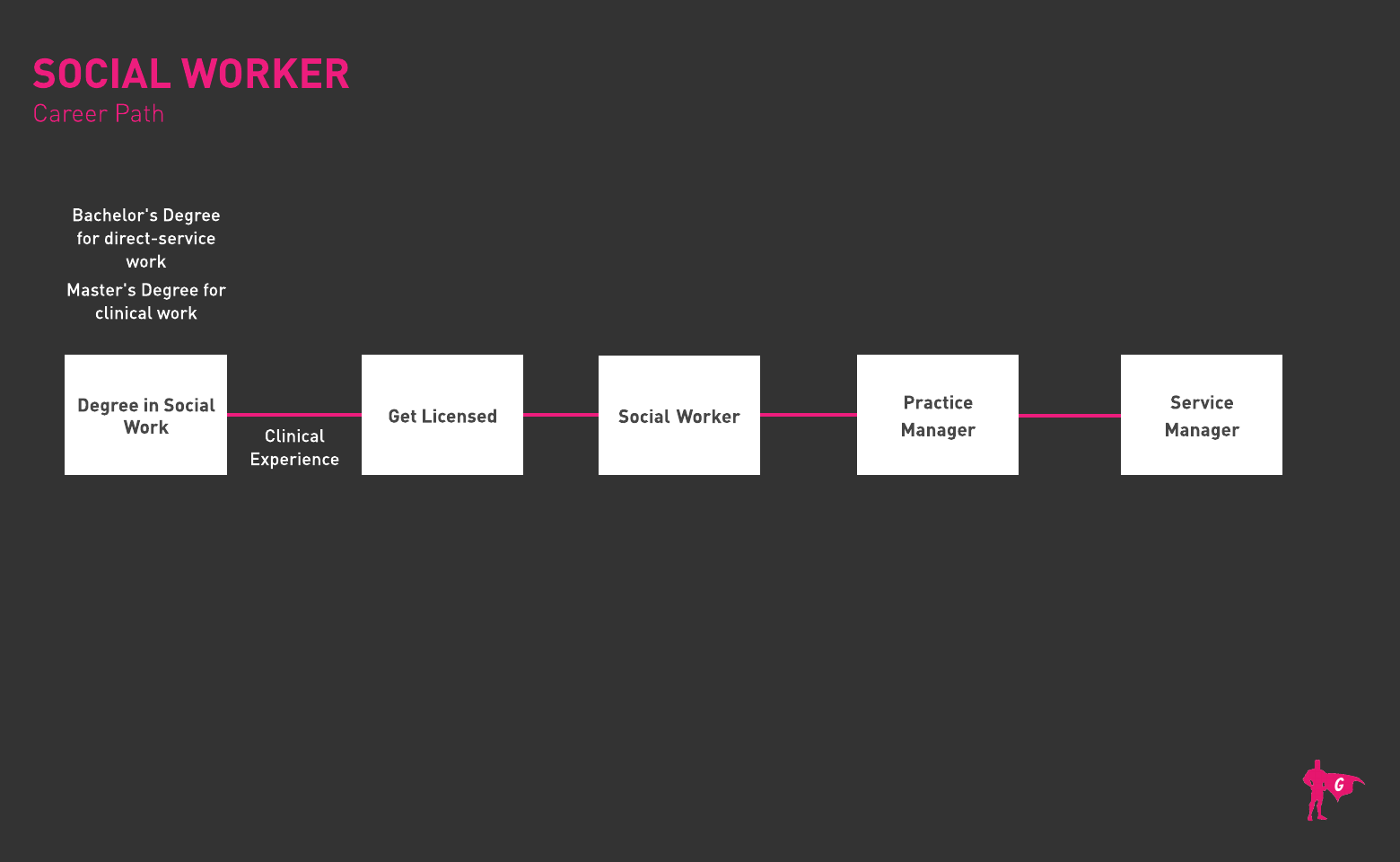Spotlights
Licensed Clinical Social Worker, Caseworker, Case Manager
Social workers work with people who have been socially excluded or who are experiencing crisis. Their role is to provide support and resources to enable clients to help themselves. They can work in their local community and internationally.
“My strength in social work is to identify the strength in people. It's rewarding to see really vulnerable, under-privileged, or under-resourced people realize their potential and realize they are innately good at things and they will not be oppressed their whole life. It can be so difficult for people to look past tomorrow with all the struggles hanging over their head, but once you start helping people see their potential again, they can begin to think about the future, set goals, and to dream. That is the ultimate reward, seeing the tenacity and strength come back alive in someone.” Amy Collins, Social Worker
- Direct-Service:
- Family Social worker
- Child Protective Services Social Worker
- School Social Worker
- Foster Care Social Worker
- Clinical
- Health Care Social Worker
- Mental Health and Substance Abuse Social Worker
- A Case Manager will have a caseload of up to 5 people a day.
- Conducts interviews with clients and their families to assess and review their situation.
- Provides clients with resources such as:
- Research and refer clients to community resources.
- Legal services, healthcare, food, clothing, vocational services.
- Assist them in applying for housing.
- Setting them up with counseling.
- After working with each client there is paper work and record keeping assessing where their client is at and what actions to take in the future.
- Empathy (the heart for trying to understand) NOT sympathy
- Ability to be flexible
- Learning to compartmentalize
- Active listener
- Problem solving: taking a problem and figuring out multiple different solutions based on your knowledge of the community or person you are working with.
- Personable
- Intuition: ability to sense situations before they escalate.
- A good listener
- Licensed Clinical Social Worker
- Mental health clinic
- Hospital
- Private-Practice
- Schools
- Social Worker (Domestic)
- Homeless shelter
- Human Resources at any business
- Non-profit organizations
- Social Worker (International – policy, programming)
- Non-profit organizations/NGO
- Government Organization
- PhD in Social Work
- University
- Requires an investment of your time that requires a passion to want to better people’s lives and mental health status. This does not always get done during a 9am - 5pm workday. There will be long hours required.
- Must learn to compartmentalize and set boundaries between your home and work life.
- “Self care” is a term often used in the social services field meaning you must make it a priority to take care of yourself physically, emotionally, and mentally because you can not help others if you aren’t taking care of your self.
- Go to therapy.
- Have a mentor.
- Take time off work if possible to avoid getting burnt out.
- Often played the role as problem solver or mediator between friends.
- The friend everyone would go to for advice or because they were an un-biased, good listener.
- Valued authentic relationships.
- To be a Social Worker, ideally, you’ll want at least a bachelor’s in a relevant major (such as social work, public policy, social services, or social science) to qualify for entry positions
- Most prospective Social Workers must also perform supervised fieldwork or internships
- A Master’s in Social Work teachs clinical assessment and diagnostic skills that can help you get hired or qualify you for better-paying jobs
- Those who perform clinical social work definitely need a master’s degree, along with a state-issued license and supervised practicum clinical experience (or internship)
- Employers may be more likely to hire a licensed master social worker (LMSW) or licensed clinical social worker (LCSW)
- Note, nonclinical Social Workers may need a license depending on which state they work in
- The Association of Social Work Boards features information regarding state requirements
- Supervised clinical training will continue, sometimes for years, as you work and gain experience
- Degrees should be from programs that are accredited by the Council on Social Work Education
- Common courses include psychology, sociology, social welfare policy, ethics, economics, and political science
- In high school, stock up on advanced classes in psychology, sociology, social welfare policy, ethics, economics, and political science
- Strengthen your communications skills such as English, writing, speaking, giving presentations, and negotiating
- Volunteer to work with local social welfare organizations to gain real-world experience and exposure to problems, conflict resolution techniques, and more
- Look for social work internships in your local area
- Decide if you want to complete a Master’s in Social Work. You’ll need a master’s if you want to do clinical work or get licensed
- Think about the various specialization areas, such as Child, Family, and School Social Workers; Healthcare Social Workers; and Mental Health and Substance Abuse Social Workers
- Per O*Net Online, these different specialization areas have various typical education requirements. For example:
- Child, Family, and School Social Workers — 69% have a bachelor’s, 26% a master’s, and 6% an associate’s degree
- Mental Health and Substance Abuse Social Workers — 77% have a master’s, 19% a bachelor’s, and 4% a post-master’s certificate
- Healthcare Social Workers — 70% have a master’s, 15% a bachelor’s, and 11% a post-master’s certificate
- 8.7% with HS Diploma
- 6.8% with Associate’s
- 33.7% with Bachelor’s
- 32.9% with Master’s
- 2.9% with Doctoral
(% of employees aged 25 to 44 in the occupation whose highest level of educational attainment is)

- There is no shortage of Social Worker jobs, but it can be helpful to understand which sectors most of them are in
- Per BLS, there were 715,600 Social Workers, as of 2020. 335,300 — about 1/3 — perform Child, family, and school work; 184,900 are in healthcare; 124,000 work in mental health/substance abuse; and 71,400 do “all other” social work
- 18% are employed by individual and family services; 14% are employed by local government agencies, 14% by ambulatory healthcare services, and 14% by state governments
- Set up profiles on job portals such as Indeed, Glassdoor, and Zippia to get notified of openings
- Build your network while doing internships and field work; it is possible to roll those experiences into full-time employment
- Get involved with local community groups as well as national organizations (see Recommended Resources > Websites). Attend conferences, host events, do site visits, give presentations, share information on social media, and make connections!
- Advertise your availability on LinkedIn and other platforms
- Ask former teachers and co-workers if they’ll serve as references
- Scan job posts for keywords and skills needed; make sure your resume reflects your ability to match the employers’ requirements
- Obtain your state license to be a licensed master social worker (LMSW) or licensed clinical social worker (LCSW), if desired
- Review Social Worker resume templates to get ideas for your resume
- Study Social Worker interview questions to prepare for job interviews!
- Stay on top of new developments in the field, go to seminars, and continue educating yourself after you have completed your schooling.
- Self-Care
- It is not about competing with other social workers, but to better yourself so you can continue to best serve people.
- Be idealistic but stay grounded.
Websites
- American Association for Marriage and Family Therapy
- American Counseling Association
- American School Counselor Association
- Association for Addiction Professionals
- Association for Community Organization and Social Action
- Association for Play Therapy
- Association of Social Work Boards
- Council on Social Work Education
- National Association of Social Workers
- National Hospice and Palliative Care Organization
- National Kidney Foundation Council of Nephrology Social Workers
- School Social Work Association of America
- Society for Social Work Leadership in Health Care
Books
- Days in the Lives of Social Workers: 62 Professionals Tell "Real-Life" Stories From Social Work Practice, by Linda May Grobman and Kathryn Conley Wehrmann
- Empowerment Series: An Introduction to the Profession of Social Work, by Elizabeth A. Segal, Karen E. Gerdes, et al.
- Introduction to Social Work: An Advocacy-Based Profession (Social Work in the New Century), by Lisa E. Cox, Carolyn J. Tice, et al.
- Social Work Documentation: A Guide to Strengthening Your Case Recording, by Nancy L. Sidell
Alternate careers with or without more education: Psychologist, School and/or Career Counselor, Anthropologist, Sociologist, Probation/Corrections Officer, Lawyer, Lobbyist
Newsfeed

Featured Jobs

Online Courses and Tools

Annual Salary Expectations
New workers start around $50K. Median pay is $62K per year. Highly experienced workers can earn around $78K.





